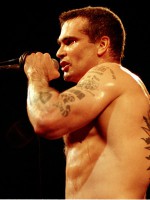First Descent is a film of genre Documentary released in USA on 2 december 2005 with Henry Rollins
First Descent (2005)
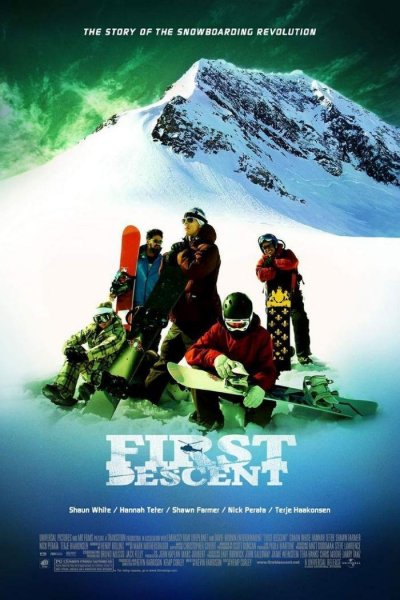
If you like this film, let us know!
- Infos
- Casting
- Technical infos
- Photos
- Videos
- Film quotes
- Characters
- Music
- Awards
First Descent is a 2005 documentary film about snowboarding and its beginning in the 1980s.
The snowboarders featured in this movie (Shawn Farmer, Nick Perata, Terje Haakonsen, Hannah Teter and Shaun White with guest appearances from Travis Rice) represent three generations of snowboarders and the progress this young sport has made over the past two decades. Most of the movie was shot in Alaska and its back country.
It is the first movie to be produced and financed by a soft-drink company.
Synopsis
Documentaire sur les exploits de snowboarders expérimentés. Cinq des meilleurs athéltes de ce sport sont emmenés dans les montagnes de l'Alaska pour réaliser l'exploit de leur vies.Actors
Comments
Leave comment :
Suggestions of similar film to First Descent
There are 0 films with the same actors, 8963 with the same cinematographic genres, 4182 films with the same themes (including 431 films with the same 2 themes than First Descent), to have finally 70 suggestions of similar films.If you liked First Descent, you will probably like those similar films :
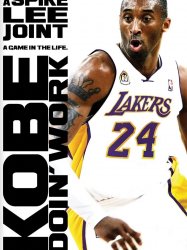
Kobe Doin' Work (2009)
, 1h23Directed by Spike Lee
Origin USA
Genres Documentary
Themes Sports films, Basketball films, Documentary films about sports, Documentaire sur une personnalité
Actors Kareem Abdul-Jabbar, Spike Lee
Rating65%





Kobe Doin’ Work is an 84-minute exploration of Kobe Bryant’s work ethic, his in game mentality, and his bluntness that makes Kobe a great competitor. [1] It focuses on Kobe Bryant during one day of the 2007–08 Los Angeles Lakers season. Bryant granted filmmaker Spike Lee and 30 cameras unprecedented access to his life for one day. Kobe: Doin' Work premiered on ESPN on May 16, 2009.The documentary follows Kobe Bryant during the 2007–08 NBA season throughout the April 13, 2008 game against the San Antonio Spurs.[2] The game in which Kobe was documented and given a microphone to capture live in game moments was a heated game with the rival Spurs. Kobe shot 6 of 14 from the field, scored 20 points, and played 32 minutes. The game was a crucial game in the end of the regular season, as the Los Angeles Lakers hoped to keep first place in the Western Conference with a record of 55-25. Spike Lee was interviewed asking why he chose Kobe Bryant to direct this documentary, in which Lee replied, "I'm a big basketball fan. It was obvious. He was having an MVP-type year, in which he did win the MVP. Also the Lakers looked like they were going to take it to the Finals. And I wanted them to beat the Celtics. I hate the Celtics. But the Celtics won. But I don't think I was taking a gamble by choosing Kobe." (Lee, NBA.com)3. Kobe agreed to let Lee microphone him during the game, in which he also played in the game. According to Spike Lee, "He (Kobe) said several times how much fun it was just doing it." (Lee, NBA.com)3. The 83-minute documentary ran on ESPN commercial free.[3] The documentary also focuses on Bryant and the team in huddles and during time-outs. The cameras also get full access of coach Phil Jackson in the locker room with the team during half-time.[4] Bryant provided the voiceover for the documentary on February 2, 2009, hours after he scored 61 points against the New York Knicks at Madison Square Garden, (then a single-game record at the arena, which has been broken since).[5] Spike Lee said that he was excited for Kobe to do the commentary following a game at Madison Square Garden, but no one expected a 61-point performance from Bryant. "I know that if he had a terrible game the commentary would not have been the same. Guaranteed. But Kobe said he made a point to make sure not to lose the game or he would hear it from me." (Lee, 8th paragraph)3. Kobe indeed said in an after game interview that he was going to give the game his all in order to show Spike Lee a thing or two about Bryant’s skills on the court against the Knicks. "On a lighter note, I'm going to review this documentary I'm doing with Spike Lee tonight after the game and I didn't feel like sitting next to him and hearing him talking trash about the Knicks, so that was added incentive as well. Seriously. He's going to get an earful tonight." (Bryant, 8th paragraph, ESPN.
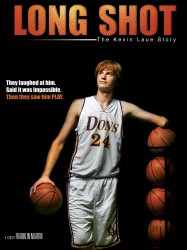
Genres Documentary
Themes Sports films, Basketball films, Documentary films about sports
Rating71%





Before he was born, Laue's umbilical cord wrapped around his neck in the womb. To save his own life, Laue used his arm to protect his neck. Lack of circulation to the arm caused him to be born with an arm that ended just below the elbow. Kevin’s father died when he was in middle school. A former athlete and youth coach, his father had difficulty accepting Kevin’s disability. The will to carry on for his family and make his father proud drove Kevin to follow his own path of success by playing extraordinary basketball.
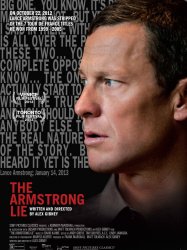
The Armstrong Lie (2013)
, 2h2Directed by Alex Gibney
Origin USA
Genres Documentary
Themes Sports films, Transport films, Cycling films, Documentary films about sports, Documentaire sur une personnalité, Documentary films about technology
Actors Anderson Cooper, Oprah Winfrey, Alex Gibney, Larry King
Rating71%





In 2009 director Alex Gibney set out to film The Road Back, a documentary on cyclist Lance Armstrong's comeback year after a four-year retirement from the sport. Three years later, on October 2012, a doping investigation led to his lifetime ban from competition and the stripping of his seven Tour de France titles, and the documentary was shelved. On January 14, 2013, three hours after his appearance on Oprah, Armstrong went back to Gibney to set the record straight about his career.
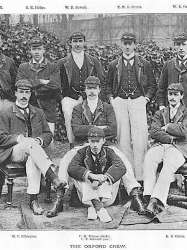
Directed by Birt Acres
Origin United-kingdom
Genres Documentary
Themes Seafaring films, Sports films, Transport films, Documentary films about sports, Documentary films about technology
Rating45%






When Ali Came to Ireland (2013)
, 50minutesGenres Documentary
Themes Sports films, Martial arts films, Boxing films, Documentary films about sports, Documentary films about historical events
Actors Yul Brynner

The Summit (2013)
Genres Documentary, Adventure
Themes Sports films, Documentary films about sports, Documentary films about historical events, Disaster films
Rating67%





The disaster occurred between 1 and 2 August 2008 and cost 11 lives. During the ascent of the summit a climber falls to his death in the Bottleneck. When three climbers try to collect the body one of them also falls to his death. These occurrences lead to a delay in the summit attempt that strands several climbers for the night above the Bottleneck, in the "deathzone" (above 8000 meters), due to a serac fall killing one more climber. The documentary takes a closer look at the more unknown happenings during the night and the next day leading to another eight deaths.
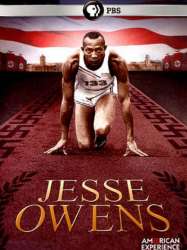
Jesse Owens (2012)
Origin USA
Genres Documentary, Historical
Themes Sports films, Documentary films about sports
Actors Andre Braugher
Rating73%





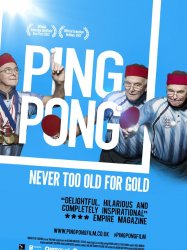
Ping Pong (2012)
, 1h20Origin Canada
Genres Documentary
Themes Sports films, Documentary films about sports
Rating71%






Knuckleball! (2012)
, 1h33Origin USA
Genres Documentary
Themes Sports films, Baseball films, Documentary films about sports
Rating70%





The film sets up the 2011 season by showing how the knuckleball saved both pitchers from obscurity. Dickey moved his family 37 times before landing with the New York Mets. The film presents Wakefield's chase of his 200th win as a member of the 2011 Red Sox and Dickey’s make-it-or-break-it season with the 2011 Mets. It demonstrates the fraternal nature of knuckleball pitchers who trade tips of the trade via various meetings with the likes of Phil Niekro and Charlie Hough. Dickey won the Cy Young Award in November 2012.

Directed by Birt Acres
Origin United-kingdom
Genres Documentary
Themes Films about animals, Sports films, Documentary films about sports, Films about horses, Horse sports in film
Rating47%





A stationary camera looks diagonally across a racetrack toward the infield showing the horses as they pass. Once the horses have passed the camera it is clear that the race has come to an end and there is a close finish between three horses. Once the race is over police officers run onto the field. The camera also displays various members of the audience moving around.
 Connection
Connection
